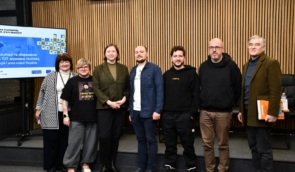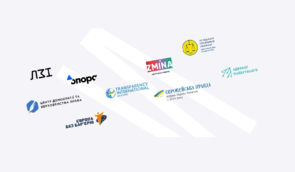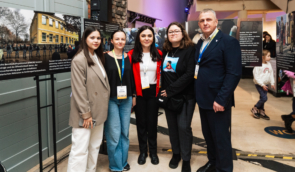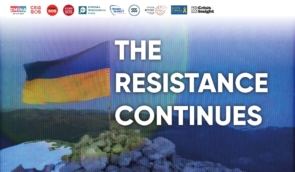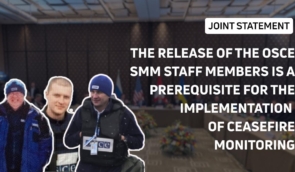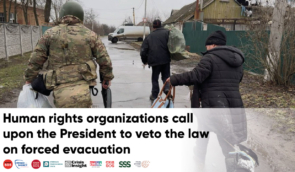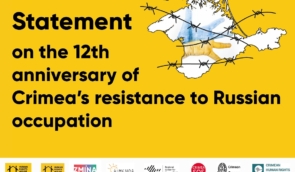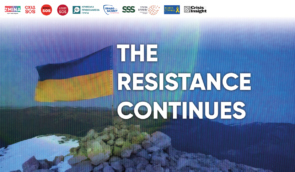Exiled from their own homes: how Russia erases pro-Ukrainian people from the occupied territories
According to a new Russian decree, Ukrainians in occupied territories who do not accept Russian passports will be designated as “foreigners,” providing an official basis to deport them from their homes.

On April 27, Russian President Vladimir Putin signed a decree that defines people living in Donetsk, Luhansk, Kherson and Zaporizhia Oblasts who do not accept Russian citizenship as “foreigners or individuals without citizenship.” This measure to require these people to apply to the occupational government for a residence permit after going through the procedure of Russian registration and providing all their documents in Russian. There is also a paragraph that calls for the deportation of people who “create a threat to the national security of the Russian Federation,” which is defined as as making efforts to “change the fundamentals of the constitutional order,” planning extremist actions, and taking part in “unauthorised” demonstration and protest.
This decision affects all people in occupied territories who, despite the extensive passportization efforts Russia has undertaken since occupying Ukrainian territory, have not accepted Russian citizenship.In addition to creating new pressure and new risks for people loyal to Ukraine to be detected by the occupation regime and face either deportation from their own homes or imprisonment, this process has another key effect. Namely, it helps the occupiers gather more personal information about people and their relatives that might be used for further surveillance of the population and conscription of men into the Russian Armed Forces.
“Their desire to issue Russian passports is explained by the process of issuing the Russian passport – the individual has to provide all their biometrical data and a large amount of personal data. Moreover, when an adult gets Russian citizenship, there can also be a decision about providing Russian citizenship to his or her children,” Alena Lunova, the advocacy director at the ZMINA Human Rights Center, told us.
In addition to the risks of surveillance and imprisonment, the occupation government is creating conditions where it is impossible to live without Russian documents by making social services, work in municipal institutions, medical help, and other basic needs accessible only to individuals with Russian documents.
“The Russian Federation is creating such conditions whereby access to social and medical help, retaining one’s property rights, being able to hold certain jobs, and even the ability to leave the occupied territories depends on having a Russian passport,” Lunova explains.
Moreover, to maintain an atmosphere of fear and force people who receive Russian passports to support the occupational government, Russian propagandists often share rumors of Ukraine persecuting and threatening to kill people from the occupied territories. This also aims to diminish the identification which people under occupation have with Ukraine, as well as their support of Ukraine, which are crucial determinants of support for Ukrainian resistance groups.
However, in spite of Russian disinformation, the Ukrainian government has another position. For example, Ukrainian Human Rights Ombudsman Dmytro Lubinets advised Ukrainians in the occupied territories to accept Russian passports if they had to do so in order to survive or avoid arrest and imprisonment.
“Ukraine’s reaction is proportional – we don’t accept it as a citizenship, and we don’t persecute these Ukrainian citizens, understanding that the occupiers have forced them to get Russian citizenship,” Lunova adds.
Since 2014, Russia has been working to erase any traces of Ukraine in the territories it occupies by conducting pseudo-referendums, destroying Ukrainian cultural and historical heritage, persecuting people who support Ukraine, and issuing Russian passports to residents under occupation. The same tactics were used in Ukrainian territories that were occupied after the beginning of Russia’s full-scale invasion. The occupational government first forced people to use Russian SIM-cards in order to have any mobile connection, and later began issuing Russian passports.
The beginning of passportization processes in occupied Ukrainian territories was justified with a decree simplifying the procedure for Ukrainians to receive Russian citizenship President Putin on July 11, 2022.
“This mass passportization and, indeed, imposition of Russian citizenship is a consistent Russian state policy which they [Russian government] have undertaken in Ukraine since the annexation of Crimea… Russia is now maintaining this practice in territories that were occupied after 24 February 2022, forcing Ukrainian citizens to get Russian passports,” Lunova argues.
While committing war crimes and destroying the historical memory of Ukrainians living under occupation, Russian authorities use rhetoric about historical justice and “returning home.” For example, Russia justified the destruction of a monument to victims of Holodomor in Mariupol by calling it “political disinformation conducted by Ukraine,” even though the Holodomor killed approximately 231 000 people in Donetsk and Luhansk Oblasts.
These actions aim to legitimize Russia’s occupation of Ukrainian territories by manipulating historical facts to portray Eastern and Southern Ukraine as “historically” Russian territories. In this case, this idea of these areas’ supposedly Russian origins is used to justify the Russian invasion and create a picture of people who are happy to “return home to Russia.” This approach can be seen in how Russian media present life in the occupied territories with “ideal” images of happy people carrying Russian symbols who are thankful to Russia for “liberation.” However, this fiction is constructed in an atmosphere of fear and persecution of all those who don’t support the Russian occupation.
“The Russian Federation does everything possible to create an atmosphere of fear. On one side, they do this to encourage deportations or the forceful internal displacement of the Ukrainian population. There are different practices to make Ukrainians in occupied territories live in an atmosphere of fear: forced disappearances, illegal detentions, torture, imprisonment of civilians, and criminal prosecutions,” Lunova explains.
The tactics of deportation which Russia is threatening to use now already have a recent history with Moscow. In Crimea and the territories of Donetsk and Luhansk Oblasts occupied since 2014, Russia has forcibly displaced many people from their homes after arresting and/or torturing them, threatening them with further punishment if they do not leave the occupied territories for Kyiv-controlled Ukraine. In recent cases, Russia has forced people to walk for dozens of kilometers in the “grey” zone between Russian and Ukrainian lines.
“All basic rights and freedoms are violated. This is a consistent practice in the occupied territories. The Russian aim is to intimidate, to break resistance, and to erase support for Ukraine from the occupied territories,” Lunova concludes.
Russia is doing everything it can to erase Ukrainian identity and resistance from the territories it occupies, and is forcing millions of people to accept their criminal rule or become literal foreigners in their own homes. The new presidential decree is another step in Russia’s imperialist policy aimed at “solving the Ukrainian question” and forcing Ukrainians to become Russians by any means necessary.
Source: UkraineWorld
If you have found a spelling error, please, notify us by selecting that text and pressing Ctrl+Enter.

